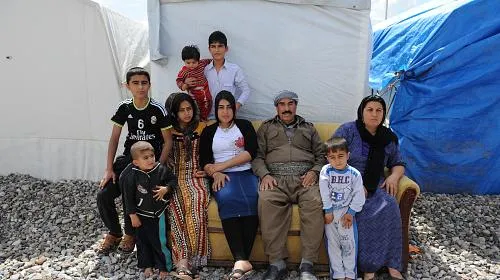Severe funding shortfalls for humanitarian assistance in the Middle East force more Syrians to leave for Europe.
ATLANTA (Sept. 14, 2015) — As the world’s attention focuses on the thousands of refugees flooding Europe’s borders, the humanitarian organization CARE is urging greater action to address the root causes of the crisis.
Increased humanitarian support is needed for countries bordering Syria. Lebanon, Jordan and Turkey are hosting 95 percent of the 4 million Syrian refugees. Ultimately, there must be strong diplomatic pressure for reaching a political solution to this conflict, now raging into its fifth year.
“CARE is pleased to see that the U.S. government and several European countries will be accepting more Syrian refugees for resettlement, but the vast majority of the refugees continue to reside in countries bordering Syria, countries that have received very little support from the global community,” said Michelle Nunn, CEO of CARE. “As the humanitarian needs have skyrocketed, humanitarian funding has decreased. To truly solve this growing crisis, the global community must address the root causes, which means more humanitarian assistance to the region and, most importantly, more political and diplomatic action in resolving this conflict.”
The current $5.5 billion humanitarian appeal for Syria is only 37 percent funded. CARE has only 49 percent of its projected funding needs secured for the next two years. Already in February, a CARE assessment among Syrian refugees in Jordan found that more than half of refugees were worried about being able to feed their family and one in three families could not access health services when they needed them.
“In August, when people saw the monthly cash rations from the World Food Program being cut by half due to funding shortfalls, they told us this was one reason why they are considering to leave to Europe now”, explains Wouter Schaap, CARE’s country director in Jordan. “Imagine having lived in exile away from your home for five years. If you can find a job, it is illegal and you risk exploitation and arrest. You lose hope. And then imagine being told that you will get only $13.50 per month to buy food when last month you had $27. Wouldn’t you also consider getting on a boat?”
CARE welcomes the US Government’s plans to accept 10,000 refugees in 2016, but that is only a small fraction of the four million Syrian refugees. In Lebanon, Syrian refugees are now 25 percent of the population. CARE also stresses the need to plan in time for the coming winter months – both in Europe and the Syria region. “Winter in the Middle East might not be as cold as in Europe, but there have been severe snow storms over the last years and people are barely protected from the cold in often flimsy and unheated shelters,” reports Schaap.
In response to the Syria crisis, CARE has reached over one million people in Jordan, Lebanon, Turkey, Egypt, Yemen, as well as those displaced inside Syria, with emergency assistance. CARE provides emergency cash assistance, psychosocial support, information, referrals, and strengthens water supply and sewage systems, so both Syrian refugees and host families’ lives are improved. Inside Syria, CARE delivers food and emergency supplies to families, and emergency medical equipment and support for women. We also work through partners to provide families with livelihoods support, microfinance and psychosocial support.
About CARE
Founded in 1945, CARE is a leading humanitarian organization fighting global poverty and providing lifesaving assistance in emergencies. CARE places special focus on working alongside poor girls and women because, equipped with the proper resources, they have the power to help lift whole families and entire communities out of poverty. CARE’s provision of life-saving services to Syrian refugees and host communities in Jordan, Lebanon Egypt, Turkey and Yemen and to people affected by the crisis in Syria has reached more than a million people. CARE is currently providing food, water and other support to refugees arriving in Serbia.

